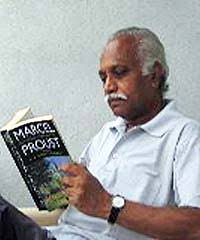Domain of the Devil – A Satire on Indian Publishing

When at length, Suresh was finding his moorings at Tihar; Subba Rau was brought in to a near stampede there. Why not, the whole nation knew him by then as the man who had pricked at the Premier’s face. When Suresh enquired what the fuss was all about, Rau said it was but a ‘literary coup’. Probed by Suresh for an account, Rau unfolded the story of his life and times as an unpublished writer.
In his mid-forties, Rau was seized with an urge to bring himself onto the fictional stage. So to lend scope for his boundless creativity, he chose the vastness of the ‘novel’ as the setting. And for the medium of expression, he bypassed his mother tongue, Telugu, the Italian of the East. Instead, he chose English not only for its ability to nuance the complexities of life but also for the flair of expression he had in it. Drawing from his examined life, he set out to portray a young woman’s life on the male canvas of India.
Ironically, it was his love for language that impeded the start, but soon enough he got his poetic prose right for the narrative in mind. With his creativity in command over the unique plot he conceived, he wrote with gusto and had his dream novel for his debut in nine months flat. After toiling for a while, for that ‘apart title’, he pitched in for ‘Tangent of Fate’. Then, with a top-of-the-world feeling, he dispatched the manuscript to a leading publisher in New Delhi. While he took the publisher for granted, he received his manuscript post-haste. And that made him see the irony of the title he had chosen for his novel!
This bolt from the blue shook Rau to the core, and he came to doubt his abilities as a novelist. Thus, holding the manuscript, as one would his dead child, he had a last look at it, as the father would, before the burial. But seeing it as crisp on its return as it was when he had posted it, he felt cheated. As he realized that none at the publisher’s end had an open mind, he saw the rejection letter all again. He felt sad at the ungracious averment of unsuitability on the designer letterhead.
Impulsively, he felt like resubmitting the manuscript with a rejoinder that the concerned editor could take her own time to read and reject it, if it were a must. But, on second thoughts, he realized that it would be treated as sour grapes, and thus kept his own counsel. Anyway, he tried his luck with other Delhi publishers, this time, all at a time. To his distress, it was like the quote of a cartel: Read your manuscript with interest but found it unsuitable for our publication.
As a last resort, in what was a reverse phenomenon, he looked Westward for salvation, only to be informed that unsolicited souls wouldn’t be baptized there. Though he felt it was cruel, he thought it was an honest averment nevertheless. Could it be the unstated policy of the Delhi operatives as well, he suspected, but, couched by the pretentious unsuitability labels!
To get a feel of the publishing scene back home, he pored over the periodicals and the newspaper supplements in right earnest. What amused as well as frustrated him was that while some publicized the published titles to the hilt, the others debunked them as junk in the reviews. Taking the reviewers seriously, he forwarded his manuscript to them, indicating that it had all the ingredients they believed a novel should have in it. And as none of them responded, he wondered whether the critics were more interested in condemning a work than commending any.
And, to find the pulse of the Indian writing in English, he picked up some of the well-hyped novels. As he scanned through them one by one, he was amused to find the two basic features of the published kind: if it was not a case of the Western characters on the Indian stage, then it must be the Indian Diaspora in the Western setting. It appeared to him as though writing about the Indians in India was passé for the publishing world.
In that he saw a literary conspiracy — inducing Indian writers in English into churning out self-deprecating stuff to cater to the prejudices of the Western readers. Well, the aspiring authors too went along to provide vicarious pleasure to the Western readers by negating India. That was why, realized Rau, the tent of the Indian novel in English laid with the worn-out Western pegs in the loose native soil came flat at the whimper of a scrutiny. When it came to the Diaspora produce, it was the wont of the Western media to launch it in India in the haze of publicity to dazzle one and all. Well, but, for a novel to impact its readers, it must be the soulful tale of a people steeped in their native soil, isn’t it?
But then, why the guys should go to such lengths after all? Well, wouldn't have they sensed the potential of the myriad hues of Indian life to shape fascinating pictures of fictional world? What if, in time, some Mahabharata-like creativity resurged in Indian writing in English? Would not the emerging Indian enterprise commercialize it by inundating Western markets? If that were to happen, wouldn’t the public there lap up the same and give up on the Western pulp fiction?
So, reckoned Rau, the Western publishers had set up shop here to avert that eventuality. And the tactic employed by them was to encourage hybrid fiction through publication and dissuade the genuine novel by its rejection. Understandably, Indian writers fell into the trap and began inking hotchpotch on the Western dotted lines. Moreover, to ensure that none deviated from the set course, the publishers had seen to it that the shape they gave it became the norm of the Indian novel. This they could achieve by picturing in the local media that the Indian writing in English was making waves everywhere in the West. Yet, taking no chances, they would keep the bait dangling by doling out hefty advance, on and off, to an odd insider to keep up the farce. It was thus that, the vested interests of the West managed to nip in the bud the genuine Indian novel in English, and averted its challenge to their commercial writing.
However, raising Rau's hopes, as some literary luminaries projected themselves as Man Fridays of the budding authors; he became expectant and felt the world of writing was not all that rough. But when they too cold-shouldered him, he realized that they were only at self-image building, knowing fully well that someone calling their bluff was remote enough. Thus, he realized that the media was but a manifestation of the make-believe at its best. Nevertheless, he philosophized that all could be expected to be busy, getting on with their lives, besides pursuing their own interests. He felt at length that it would be a futile exercise on his part to seek help from any quarter.
Just the same, the irony of the writers’ plight pained him. While the ‘hard to please’ editors reduced the aspirants to the ranks of unpublished writers, the ‘harder to amuse’ reviewers seemed to wait in the wings to turn the published ones into failed authors! Anyway, while tending to debunk the book on hand, Rau had observed that most of the reviewers aired their grandiose views on the book’s topic or tried to exhibit their profound scholarship and/or both. It was as if the book under review provided a stage for their literary exhibitionism!
What distressed Rau most about the reviewers though was the tendency of some to wonder why the book was written at all! And it was in the advice of the reviewers that the author should cease writing that he saw the hand of cruelty in the world of letters. He wondered why they wouldn’t realize that their advice was inimical to their own interests, for without books, where would be the need for reviewers? Wasn’t there a felt need for the prevention of cruelty towards the writers? Above all, the publishers and the reviewers alike appeared unconcerned about the hapless readers for whose sake the show was supposedly run.
It was then that he turned to God in desperation. As though addressing his prayers, He appeared in his dream and expressed His helplessness. God said that as publishing was in the devil’s domain, there was nothing that He could do to help his cause. Thus, abandoning his further forays into the publishing world, he decided that if he were ever to write again, it would only be for the pleasure of writing, never mind the publishing.
When he could put his bitterness behind, his muse moved him all again. Weaving a story in an intricate plot, he completed his second novel in double quick time. It was as if his bottled up creativity was too eager to find its way out. Naming it as the ‘Consigned Conscience’, he nevertheless sent the manuscript to all the Delhi-wallahs at one go, though with a sense of resignation. And as another subject with a new dimension infused his urge to write, he plunged himself into his third novel.
As he was in the thick of action by the time the expected rejections arrived, they failed to dampen his spirit. And, one publisher’s missive that the theme was interesting but they wouldn’t be interested in publishing the same amused him as well. And that made him wonder as to how to write a theme-less wonder for their approval, that was, if they were serious!
When in time, he completed his third novel; he realized that he was back to the reality of life. By then, however, he realized that to be published, one needed either a reference or a recognizable name. As he knew none who ever stepped into the corridors of a publishing house, he thought, before submitting his fresh manuscript, it was an idea to make a name for himself.
Realizing that in the media world, the divider between notoriety and fame was rather thin, he wanted to turn notorious to help the cause of his writing. So he came to New Delhi, to be a part of the crowd that greeted the Prime Minister on his birthday. With a rose with thorns in his hand, he had no problem with the security personnel there. It was thus, he found himself in the queue and waited for his moment. And when the Prime Minister came near him, he pricked at his face with that rose of thorns. When the security detained him for wrongful assault, the media picked up the story to splash it on the front pages.
And that gave him the much-wanted name, didn’t it? Even before he could grasp the import of his notoriety, every publisher in Delhi approached him to commission him into writing ‘Why I pricked at the PM’s face!’ Though vindicated, he experienced the problems of plenty as all pressurized him to sign for them. But, for sentimental reasons, he opted to write for that book house, reading whose publications helped him mature into a writer. Though he wrote his three novels at breakneck speed for they carried conviction, he found himself struggling to put a sentence in place for the commissioned work.
When in the end, Suresh wanted to know how he believed his rejected works were worth their effort, Rau said that it was a good question, and mulled over for an answer.
“If only you know,” said Rau, “why a hand-to-mouth someone, neglecting his means of survival, wrote ten hours a day for years on, that would answer your question. But as that is too abstract to carry conviction, let me draw your focus on my body of work. Well, all my novels were products of original ideas from the plot downwards. Good or bad that makes them works of art. After all, what is a novel but a creative idea that ever holds in the context? Besides, the beauty of fiction in part is that it tends to lead towards the fact.”
“Why did you write the second and third novels when there were no takers for the first one?”
“In its essence, writing is primarily an art of self-expression,” said Rau. “And about novel writing, didn’t Jane Austin say that ‘in a novel the greatest faculties of human mind are on display.’ Only after handling a couple or more themes would a novelist come to know about the true capacity of his creative mind. Besides, of what worth is a novelist if he fails to make each of his work unique in itself. But, the bane of the modern world of letters is that many are writing though they have no business to write. But with so many imitating the existing, or writing out of the libraries, there is a surfeit of pseudo fiction. But, a novel is the brainchild of imagination and not a hotchpotch of all that’s known. And it is this narrative routine that makes the genuine readers skeptical about the novels in general. And that’s how the classic novel and the genuine novelists have come to grief alike.”
Finally, Suresh wanted to know how Rau handled the failures.
“The beauty of the endeavor obliterates the ugliness of the rejection,” said Rau. “As I was ever engaged in trying, I had no time to masticate my failures.”
“All said and done,” said Suresh, “what sense does it made of being a writer?”
“If anything,” said Rau, “writing a book is like planting a seed. And if it gets published, it’s like the sprouting of a plant. If not, it’s a lonely furrow in a no-man’s land. Like the gardener tends the plant into a tree, it’s the readers who help the book grow in stature. Blessed are the authors who would be able to live long enough to smell that their readers savored the fruits of their creativity. Oh, how that affords such the emotional fulfillment associated with original writing and the ego gratification that applause accords! And in spite of the media hype to the hilt, I'm not sure if all the writer-celebrities derive the emotional fulfillment associated with creative writing. Whatever, in my case, the pain of rejection made me immune to frustration.”
After having heard Rau, Suresh felt that in the world of letters, the published and the unpublished writers, being free, were alike condemned.
This is the eponymous chapter in the author’s second novel, Jewel-less Crown: Saga of Life, a free ebook in the public domain.
Related posts
Katie After The End
She thought it was time to put her sword away… but then the Demon Lords returned.
Immerse yourself in the riveting saga of a Latina heroine, enslaved by demons, who rises from the ashes of the Apocalypse.
Meet Katie, a beacon of hope in a world ravaged by war. Just when she thought her days of battle were finished, a cryptic message shatters her newfound peace, making her question everything she fought to accomplish.
Thrust into a world teetering on the brink of destruction, Katie is faced with challenges that test her resolve. Can she overcome deep-seated racial prejudices? Can she mediate peace between two embattled factions? Can she endure the trials of her first love? Above all, can she vanquish the darkness threatening to engulf her world?
From the pen of bestselling author Scott W. Kimak comes another tale of love, loss, and suspense in this breathtaking story of one of his most memorable characters. If you like action-packed nail-biters that keep you on the edge of your seat, then you'll love Katie After the End.
Buy Katie After the End and get ready for the ride of your life today!
https://www.amazon.com/After-End-Post-Apocalyptic-Survival-Extinction-ebook/dp/B0CJ24HKFH
Deepening Your Personal Relationships: Developing Emotional Intimacy and Good Communication
Deepening Your Personal Relationships: Developing Emotional Intimacy and Good Communication
(ISBN: 978-1-61897-590-4)
Looking for Better Relationships? Let the Experts Tell You How!
Deepening Your Personal Relationships was written by three experts in the field. Their combined expertise will help you in Developing Emotional Intimacy and Good Communication, which will be beneficial in all types of relationships.
Everyone wants to improve and deepen their relationships. The book explains how to achieve healthy and fulfilling interpersonal relationships by using effective communication, empathy, shared transformational development, and constructive conflict resolution to achieve this aim. Deepening Your Personal Relationships provides original, meaningful, and transformational insights that are especially helpful in understanding how to overcome our subconscious resistance against emotional intimacy and good communication. The goal is to understand how good relationships can produce enhanced levels of spiritual development, psychological healing, self-understanding, creative functioning, inner peace, happiness, and ultimately, fulfillment in life. A section on improving society through enhancing interpersonal relationships is also included.
Thus, readers wanting to enhance their personal relationships, gain insight into transformational self-help, and achieve social transformation will find this book especially helpful. The authors anticipate that this book will also be of keen interest to professional relationship counselors, including marriage counselors, family counselors, and conflict mediators, as well as community organizers and social activists.
Targeted Age Group:: Adults and Teens
What Inspired You to Write Your Book?
We were inspired to write this book as a way of helping readers understand how to develop psychologically healthy, fulfilling interpersonal relationships, with true love, good communication (i.e., open, honest, direct/non-evasive, nonjudgmental/non-blaming, respectful, communication). Another related goal was to help readers understand and overcome the ego’s fearful, narcissistic, attempt to undermine the development of experiential closeness or caring intimacy in relationships. Furthermore, we sought to alert readers to how good relationships can contribute to the development of greater levels of psychological wellbeing, genuine self-understanding, and spiritual awakening. We authors are deeply saddened to see many potentially beautiful and happy relationships fail because of the lack of public understanding of psychological factors that can facilitate or impede the development of true love, experiential intimacy, and good communication; and that is the primary reason why we feel a responsibility to make our combined insights available to the public.
Book Sample
Excerpt from the Introduction of the Book:
Some of the basic components of a real, lasting relationship that will be discussed more extensively in this book (especially a more detailed description of the basic components in chapter 1) are summarized as follows:
1) Relating to the person and not the persona. One is in a real relationship with another individual to the degree that one relates to what is actually experientially real in the other person, from moment to moment, rather than relating to what the other individual offers up as a self-concept, or to the concepts, images, and presumptive interpretations that we project or superimpose upon the other. In addition, one must offer up to the other what is experientially real in himself or herself, rather than offering some idealized conceptual self-definition, or predetermined psychosocial mask, with which one is identified.
2) Growth-oriented rather than object-oriented: An optimal real relationship offers opportunities for transformational developmental growth of liberating new insight, leading to more fulfilling ways of functioning, or living, rather than being locked into predetermined ways of relating and functioning, as well as holding predetermined views of oneself, the other person, and the relationship itself. Openness to liberating new insights can significantly enhance the functioning of each of the individuals in the relationship, as well as enhance the functioning of the relationship itself, arousing what is most creatively empowering, productive, revealing, constructive, vibrantly alive, healing, transformational, and spontaneous in each individual, as well as in their relationship. Later in this book, we will also discuss how a pseudo-relationship, egoistic relationship, or object relationship is devoted to making an object of the other person, meaning the person views the other as a defined interpretive label and controlled possession, or an “It,” in Martin Buber’s terminology (reference note 3), rather than empathically tuning into their living energy presence and experiential states, or what Buber calls the “Thou,” and valuing the other individual and one’s relationship with them for its own sake, primarily, rather than just valuing them for the sake of some kind of egoistic gratification that they are expected to provide. That kind of predetermined, controlling way of relating to another individual restricts rather than enhances the transformational growth of each individual, and of the relationship itself, in contrast to relationships in which greater levels of openness, flexibility, insight, and creative transformation exist. When the other person relates to you with what is experientially real in themselves, it will naturally trigger in you a spontaneous experiential reaction, which if observed non-dualistically and non-judgmentally will yield creative self-understanding, (reference note 4), which in turn will serve as the basis of transformation into more fulfilling levels of psychological functioning, or psychological growth. (We are using the terms “creative self-understanding” and “genuine understanding of others” to refer to insights that come from direct experience and from openness to the deepest core of one’s own being–unrestricted and undistorted by any preconceived interpretive presumptions). In contrast to a growth-oriented relationship, an object relationship exists if one relates primarily not to the whole person, but rather, to the particular aspect of another person that one can exploit for one’s own gratification. In such a relationship, there is an attempt to prevent the other person from outgrowing old habits and growing in real self-understanding and self-transformation because that prevention of growth guarantees that one will not lose the particular aspect of the other individual that one is using for self-gratification. For example, a dependent person makes you feel strong, so you do not want her to outgrow her dependency.
3) Unconditional acceptance of the whole person: One is open to and non-judgmentally accepting of the whole of the other person, and not just focusing selectively upon whatever partial aspects of them relate to one’s own perceived need for gratification. Unless you are first able to accept yourself unconditionally, you are not free to accept the other person unconditionally, and be in a real relationship with them. For example, if you label yourself as weak and insecure, and you seek to compensate for those traits through the relationship, you will look for and accept only strength and security in the other individual, and reject all other contradictory traits.
True love is not selective, not a positive value judgment, not a conditional intense favorable valuing, an extreme approval, a conditional acceptance, of preferred or desired partial aspects of the other individual, but, rather, love is an unconditional acceptance of and appreciative empathic attunement to the whole other person, including their indivisible whole life energy presence, and all of its natural expressions and genuine experiential aspects. The whole of the other person is perfect to us, or beyond conditional approval and disapproval, but not perfect as an idealized image of unrealistic infatuation projected onto the other individual, conditionally value judged extremely positively, or extremely favorably, for partial aspects of him or herself that conform to our own selective preferences, expectations, needs, and fantasies; instead, the beloved is unconditionally accepted as being of absolute value as a living energy presence. When we truly love someone, we do not conditionally value them only when they conform to our own selective needs, expectations, needs, and fantasies; instead, the beloved is unconditionally accepted as being of absolute value as a living energy presence.
To truly love someone is to relate to, appreciate, and cherish what is actually, naturally real in them, rather than projecting imaginary idealized images and valuing that in them. We intuitively recognize that the beloved simply feels right for us, they simply belong with us, their energy presence feels like a naturally compatible “good fit” with ours. We intuitively recognize a deep sense of mutual inner familiarity with the distinctive life energy presence of the other individual, so our love or caring is not dependent or conditional upon the other individual conforming to some kind of idealized image of perfection, demanding expectations, or preconceived roles. That intuited sense of natural relatedness of being, inherent belonging, or inner familiarity enables individuals to remain unselfishly devoted to one another and to unconditionally remain together “for better or for worse,” as suggested by the traditional marriage vow, but also applicable to other kinds of non-marital caring relationships.
True love is enduring, not temporary, for it is not dependent upon any conditional reason (there is no “I love you because….”); it is not conditional, because our intuitive recognition of natural relatedness of being or inner familiarity does not depend on changing circumstances or upon altering or distorting the other person’s natural real being, experience, and expressions. True love is free of conditional valuing based on self-seeking motives, so our love does not depend on, or is not conditional upon, having the beloved provide us with intense feelings of excitation and gratification (be they sexual, sensual, intellectual, emotional, entertaining, financial, etc.). We love the other person for their own sake, and are contented to relate to what is actually experientially real and spontaneously natural in them, regardless of whether they gratify particular needs, ideals, fantasies, and expectations that we may value.
True love is sufficient unto itself, and therefore unconditional, because it is fully satisfying to the core of our being, even if it does not satisfy the ego’s conditional expectations and needs. True love can be unconditional and without excessive self-seeking motives because it arises from an intuited sense of contentment, relaxed security, and inner wholeness of being, in contrast to relationships focusing on seeking gratification of insatiable, often unreasonable, impatient, intensely demanding needs arising from the ego’s basic sense of deficiency, discontent, or lack of intrinsic wholeness, security, and wellbeing.
Because love is the essential core of life energy, it is the one basic comprehensive passion, which subsumes all of the natural constructive wholesome passions of life within itself. Perhaps all, or most, hungers, appetites, yearnings, or aspirations, are ultimately derived from, and satisfied by, the natural hunger to experience the connective energy of loving warmth in the core of the heart, as an optimal experience of wholeness, security, sweetness, beauty, grandeur, charm (wonder-full enchantment), and joyful vitality.
True love unconditionally accepts, warmly embraces, and cherishes, all that is truly real and natural in the beloved, because true joy, vitality, and beauty is found only in what is real and natural, and cannot be found in any kind of imaginary ideal or preconceived demanding expectation, which only imitates the true goodness of life energy, like a lifeless statue, doll, idol, photo, or portrait. The true goodness of the relational reality of life as love can be found, contacted, experienced only when we are contented to contact the immediacy or undefinable mystery of another person’s undivided whole being without superimposing any preconceived agendas of the controlling, selective, distorting, manipulative, ego-mind.
4) No Manipulation. Manipulation converts the other person into an object for your own exploitation. Manipulation can be overt, viewing relationships as forms of combat, such as, battles to be won and objects or possessions to be manipulated, maneuvered, managed, controlled, which affirms the ego’s power to control, as an illusory sense of security. Subtle forms of manipulation can involve insisting on tangible signs and symbols of love, as a way of enhancing the ego’s fragile sense of self-esteem and emotional security, rather than developing the ability to directly, intuitively, empathically experience another individual’s love for oneself, without demanding such tangible signs and symbols as “proof.”
5) Communication and Understanding: A Real relationship requires a sense of existential relatedness, inner connection, or shared experience, derived from a mutual understanding between the two individuals, at any given moment. This understanding involves a process of empathic communion, producing immediate, non-presumptively mediated, experiential knowledge of the other individual. True understanding is possible only when communication is open, honest, nonjudgmental, non-evasive, and unimpaired.
6) Commitment: For a real relationship to exist, or to develop, there must be a commitment to unconditional acceptance of what is naturally real in the other individual, without necessarily condoning inappropriate attitudes and non-constructive behaviors that are not intrinsic to the other individual’s natural being, but rather, acquired or learned patterns. Commitment involves being devoted to the constructive developmental growth and wellbeing of the other person, and to openness and honesty in communication even when it might possibly result in emotional pain, discomfort, or constructive conflict in the relationship.
7) Investment: Investment involves a mutual reaching out to the other person for contact. Each individual must go outside oneself and give of oneself to the other, and not expect the other to go the whole way in bridging the psychological gap between the two. The investment is like a seed that we plant in the other individual, and permit the other to plant in us, with the hope that the other will nourish it with the warmth of their caring so that one day it will grow and blossom into a flower of fulfillment. The one in whom we invest is the one we entrust with our most fragile self, and we risk that the other will shelter it so that there will be an opportunity for it to grow or be outgrown rather than being rejected or buried by us.
8) Compatibility of values. To accomplish deep mutual understanding and experiential intimacy, the two individuals must share a compatibility of values. Their primary value, that which they hold most dear, and are least likely to surrender, should be basically the same for the two, or at least compatible. Basic compatibility produces mutual empathic understanding of one another. Thus, the compatibility of basic values serves as the uniting force that connects the two individuals, although their more surface values differ. Even though, over the years, one or both individuals may grow psychologically, develop new interests and goals, or change in his or her bodily appearance, their sense of union or psychological connection is unaffected because it exists at a deeper level.
9) Respect. Without it, a relationship is object manipulation. Respect involves permitting the other to be a separate and whole person in her/his own right, rather than just an extension of you. Respect grants the other individual the natural right to have interests, goals, and needs of her/his own, apart from you. You recognize that the other individual is not your possession. You treat the other individual as an adult, as intrinsically equal to you in value and freedom, which means not taking the other individual for granted. Although this other person may always do certain things for you as an expression of caring, you should not come to expect those things to be done for you, and should never demand anything. Instead, recognize that all that the other person does for you comes out of caring, not obligation.
10) Empathy: This involves the ability and willingness to feel what the other person is feeling. It involves the ability to transcend one’s own psychological boundaries and to “stand in the other person’s shoes,” psychologically speaking, or to empathically tune into the other individual’s experiential frame of reference or view of reality. This involves the ability to perceive and experience the world, or particular situations and issues, as the other person does. Without it, one is not able to make full experiential contact with the other person, which is necessary to provide optimal understanding and experiential closeness.
11) Trust. Trust involves a relative state of assurance that if one leaves oneself vulnerable to the other individual, he/she will not take advantage of that state of vulnerability to inflict emotional pain on you. Trust implies accepting a degree of uncertainty. It involves a risk or a feeling of some degree of vulnerability. Without trust, a real relationship cannot survive, because you hold yourself back in terms of what you expose and give to the other individual.
Links to Purchase Print Books
Buy Deepening Your Personal Relationships: Developing Emotional Intimacy and Good Communication Print Edition at Amazon
Buy Deepening Your Personal Relationships: Developing Emotional Intimacy and Good Communication at CreateSpace
Buy Deepening Your Personal Relationships: Developing Emotional Intimacy and Good Communication Print Edition at Barnes and Noble
Buy Deepening Your Personal Relationships: Developing Emotional Intimacy and Good Communication Print book for sale at other booksellers
Read more about the author here.
Have you read this book? Tell us what you thought! All information was provided by the author and not edited by us. This is so you get to know the author better.
Psychological Healing Through Creative Self-Understanding and Self-Transformation
Buyer’s Guide: Psychological Healing Through Creative Self-Understanding and Self-Transformation by Max Hammer, Barry Hammer, Alan C. Butler
By Book Goodies Leave a Comment
 Targeted Age Group: adults
Targeted Age Group: adults
Category: Personal Growth
Print book price range: $19.11-$28.50
eBook price range: $9.99-$9.99
About Psychological Healing Through Creative Self-Understanding and Self-Transformation:
Psychological Healing Through Creative Self-Understanding and Self-Transformation
Are you ready for psychological healing? This book is your liberating guide to psychological growth, including self-understanding, self-transformation, healing psychologically painful inner conflicts, as well as achieving psychological and spiritual fulfillment. Some aspects of psychological health and fulfillment clarified in this book include, authenticity, sincerity, integrity, creativity, intuition, empathy, inspiration, vitality, courage, strength of character, unselfish love (or warmhearted caring), emotional security, inner wholeness, and fulfillment.
Readers will discover a new understanding of effective psychotherapy, groundbreaking diagnostic psychological testing research, as well as the distinction between the ego self-concept, the experiential self, and the transpersonal self (the real self, the relational self, or the holistic self).
The authors deeply explored their own psychological pain and experiential truth to write this book, as a way of helping readers achieve greater self-understanding, fulfillment, and liberation from psychological pain. These principles of psychological self-understanding and healing self-transformation can also enhance the development of interpersonal relationships, as well as facilitate effective and fulfilling ways of living in society. Self-transformation at your fingertips!
Purchase Print Books
Buy Psychological Healing Through Creative Self-Understanding and Self-Transformation Print Edition at Amazon
Buy Psychological Healing Through Creative Self-Understanding and Self-Transformation Print Edition at Barnes and Noble
Links to Purchase eBooks
Link To Buy Psychological Healing Through Creative Self-Understanding and Self-Transformation On Amazon
Link to Psychological Healing Through Creative Self-Understanding and Self-Transformation on Barnes and Noble/Nook
If you have read this book tell us what you thought!
Disclaimer: All information for this book was submitted by the author and is presented as is so you get to know the author and their style. Prices are subject to change.







